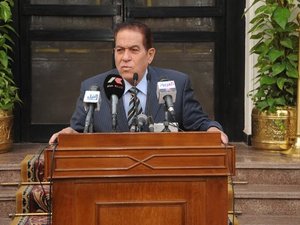Egypt PM Urges Unity for Sake of Economy

Prime Minister Kamal al-Ganzouri called on Egyptians Thursday to set aside their political differences for the sake of the economy, warning that the country's finances were deteriorating alarmingly.
The military-appointed prime minister told a press conference that much of the aid promised by donor countries had yet to arrive, while the country suffered an outflow of $9 billion in the past few months.
"Only a billion has arrived" out of $10.5 billion pledged by Arab countries, he said.
"The G8 met and decided on $35 billion for Egypt and Tunisia," he added referring to the developed nations' club. "Nothing has arrived yet.
"$9 billion left Egypt in the past few months," he added, while investors continued to avoid projects in the country after a popular uprising ousted veteran president Hosni Mubarak in February.
"Doesn't that demand of Egypt and its people to sit down and talk?" he asked. "Isn't it useful to sit down and push forward the economy a little?"
Ganzouri's nomination as caretaker premier in November by the military rulers who took over from Mubarak prompted the launch of a sit-in outside the cabinet office by protesters demanding an immediate transition to a civilian government with full powers.
Five straight days of clashes from Friday between the protesters and security forces left at least 14 people dead, according to the health ministry, and sparked an international outcry.
Voters went to the polls again on Thursday in run-offs for the second stage of staggered parliamentary elections, a landmark vote that has been overshadowed by the protest deaths.
Moody's Investors Service last month downgraded Egypt's government bond rating from B1 to B2 and placed it on review for further possible downgrade, on concerns about political instability and the worsening economy.
Foreign reserves in Egypt have fallen from $36 billion at the beginning of the year to $20 billion now.
By February, they are projected to fall to $15 billion, a level at which it will become difficult to pay for imports such as wheat, analysts say.
